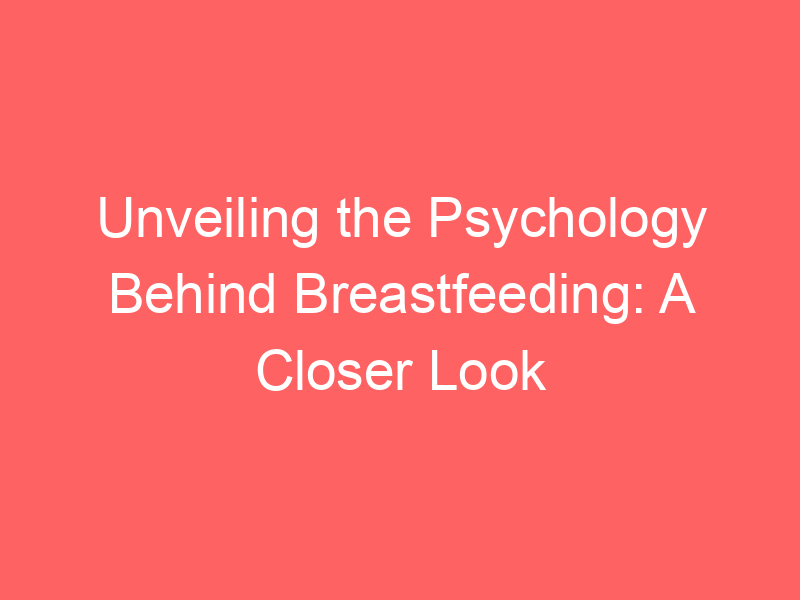Introduction to Breastfeeding Psychology
When we talk about breastfeeding, we often focus on the nutritional benefits it provides to the newborn. However, there’s another aspect that’s equally important but less discussed – the psychology of breastfeeding. This involves understanding the emotional and mental aspects that come into play during this crucial period of motherhood.
-
- Understanding the Importance of Breastfeeding
Breastfeeding is not just about providing nutrition to the newborn. It’s a process that involves a deep emotional bond between the mother and the baby. This bonding is crucial for the baby’s emotional development and lays the foundation for a secure attachment. According to a study published in the Journal of Pediatrics, babies who are breastfed are more likely to have a secure attachment to their mothers, which is a vital aspect of their emotional development.
-
- Insight into the Psychology of Breastfeeding
The psychology of breastfeeding is complex and multifaceted. It involves understanding the mother’s mental state, her feelings towards breastfeeding, and the impact of societal norms and expectations. Many mothers experience a range of emotions during this period, from joy and fulfillment to anxiety and stress. Understanding these emotions and providing the right support can make a significant difference in the breastfeeding journey. For instance, a study in the Journal of Clinical Nursing found that mothers who received emotional support during breastfeeding were more likely to continue breastfeeding for a longer duration.
In the following sections, we will delve deeper into the psychological aspects of breastfeeding, discussing the role of maternal mental health and how to overcome challenges associated with breastfeeding.
Understanding Breastfeeding: A Psychological Perspective
When we talk about breastfeeding, we often focus on the physical aspects. However, the psychological perspective is equally important. In this section, we will delve into the psychological aspects of breastfeeding, focusing on maternal psychology, emotional aspects, and the psychological benefits of breastfeeding.
- Maternal psychology and breastfeeding
Maternal psychology plays a significant role in the breastfeeding journey. A mother’s mental state can influence her decision to breastfeed and her ability to continue doing so. For instance, mothers who are confident and have a positive attitude towards breastfeeding are more likely to succeed in their breastfeeding journey. On the other hand, mothers who experience anxiety or depression may face challenges in breastfeeding. Wikipedia provides a detailed overview of the psychological aspects of breastfeeding.
- Emotional aspects of breastfeeding
Breastfeeding is an emotional journey that can bring a range of feelings, from joy and bonding to stress and frustration. The act of breastfeeding releases the hormone oxytocin, often referred to as the ‘love hormone’, which promotes a strong bond between mother and baby. However, challenges such as latching issues or low milk supply can cause stress and anxiety. It’s important for mothers to seek support and guidance to navigate these emotional aspects.
- Psychological benefits of breastfeeding
Breastfeeding offers numerous psychological benefits for both mother and baby. For mothers, breastfeeding can foster a sense of accomplishment and strengthen the maternal bond. It can also help reduce the risk of postpartum depression. For babies, breastfeeding provides a sense of security and comfort. It’s a unique bonding experience that contributes to the emotional and psychological well-being of both mother and child.
In conclusion, understanding the psychological aspects of breastfeeding can help mothers prepare for and navigate the breastfeeding journey more effectively. It’s important to remember that every mother’s experience is unique, and there’s no ‘right’ way to breastfeed. What matters most is that mothers feel supported and empowered in their breastfeeding journey.
Maternal Mental Health and Breastfeeding
Maternal mental health plays a significant role in the breastfeeding journey. It’s essential to understand how these two aspects are interconnected to ensure both mother and baby’s wellbeing. In this section, we will delve into the correlation between maternal mental health and breastfeeding, and explore a case study that highlights its impact.
-
- Understanding the correlation between maternal mental health and breastfeeding
Maternal mental health and breastfeeding have a complex, bidirectional relationship. On one hand, breastfeeding can have positive effects on a mother’s mental health. According to Wikipedia, breastfeeding releases hormones like oxytocin and prolactin, which can help reduce stress and anxiety, and foster a stronger bond between mother and baby.
On the other hand, challenges in breastfeeding can contribute to postpartum depression and anxiety. Mothers who experience difficulties with breastfeeding may feel inadequate or guilty, leading to negative mental health outcomes. It’s important to note that these feelings are common and valid, and seeking help from healthcare professionals or support groups can be beneficial.
-
- Case study: The impact of maternal mental health on breastfeeding
Let’s consider a case study to better understand the impact of maternal mental health on breastfeeding. Jane, a new mother, experienced severe postpartum depression. She found breastfeeding extremely challenging, which further exacerbated her feelings of anxiety and inadequacy.
With the help of a lactation consultant and mental health professional, Jane was able to address her breastfeeding issues and mental health concerns simultaneously. She learned techniques to ease breastfeeding and received treatment for her depression. Over time, Jane’s mental health improved, and she was able to establish a successful breastfeeding relationship with her baby.
This case study illustrates the importance of addressing maternal mental health when discussing breastfeeding. It’s not just about the physical act of nursing, but also about the mother’s mental wellbeing.
In conclusion, maternal mental health and breastfeeding are closely linked. It’s crucial to provide support and resources to mothers, ensuring they can navigate the challenges of breastfeeding while also taking care of their mental health.
Psychological Aspects of Breastfeeding
One of the most profound aspects of breastfeeding is its psychological impact. It’s not just about nourishing the baby with essential nutrients, but also about the emotional bond that forms between the mother and the infant. Let’s delve deeper into these emotional aspects.
Emotional Aspects of Breastfeeding
Breastfeeding is a unique experience that can stir a range of emotions in a mother. It can be a source of joy, a moment of bonding, and sometimes, a cause of stress or anxiety. Understanding these emotional aspects can help mothers navigate this journey more comfortably.
-
- Understanding the emotional bond during breastfeeding
When a mother breastfeeds her baby, it’s not just about providing nutrition. It’s a special time when the mother and baby can bond on a deep level. The skin-to-skin contact and the eye contact during breastfeeding can create a strong emotional connection. This bonding time can also make the baby feel secure and loved.
-
- How breastfeeding can enhance mother-infant bonding
Breastfeeding is a powerful way to enhance the bond between a mother and her baby. The close physical contact promotes a sense of closeness and attachment. Studies have shown that breastfeeding mothers often report feeling more connected to their babies compared to those who bottle-feed. This is not to say that bottle-feeding mothers can’t bond with their babies, but breastfeeding offers unique opportunities for bonding.
In conclusion, the emotional aspects of breastfeeding are just as important as the physical ones. Understanding these can help mothers make the most of their breastfeeding journey and form a deep, lasting bond with their babies.
Psychological Benefits of Breastfeeding
Breastfeeding is not only beneficial for the baby’s physical health, but it also provides significant psychological benefits for the mother. Two of the most notable psychological benefits include boosting maternal self-esteem and reducing postpartum depression.
-
- Boosting Maternal Self-Esteem
Feeding a baby is one of the most fundamental tasks a mother performs. When a mother successfully breastfeeds her baby, it can significantly boost her self-esteem. She feels accomplished, knowing that she can provide for her child’s basic needs. According to a study, mothers who breastfeed often report feelings of satisfaction and empowerment, which contribute to a positive self-image.
-
- Reducing Postpartum Depression
Postpartum depression is a serious condition that affects many new mothers. However, breastfeeding can help reduce the risk of this condition. The act of breastfeeding triggers the release of oxytocin, a hormone that promotes feelings of relaxation and bonding. This can help to alleviate symptoms of depression. A research shows that mothers who breastfeed are less likely to experience postpartum depression than those who do not.
In conclusion, breastfeeding offers significant psychological benefits for mothers. It can boost a mother’s self-esteem and help reduce the risk of postpartum depression. Therefore, it’s not just about the baby’s health; breastfeeding contributes to the overall well-being of the mother as well.
Insight into Breastfeeding: Overcoming Challenges
When it comes to breastfeeding, it’s not always smooth sailing. There are common challenges that many mothers face. But don’t worry, we’re here to help you understand these challenges and provide psychological strategies to overcome them.
- Understanding common breastfeeding challenges
First, let’s talk about some of the common challenges. These can range from physical issues like sore nipples and low milk supply to emotional and psychological issues like anxiety and depression. According to Wikipedia, about 92% of new mothers report some breastfeeding difficulties in the first few days after birth. That’s a lot of moms facing challenges, so if you’re one of them, remember you’re not alone.
- Psychological strategies to overcome breastfeeding challenges
Now, let’s talk about some strategies to overcome these challenges. One of the most important things is to maintain a positive mindset. Remember, it’s okay to ask for help and take care of your mental health. Here are some strategies:
- Practice self-care: Make sure you’re eating well, getting enough sleep, and taking time for yourself. This can help reduce stress and increase your milk supply.
- Seek support: Talk to other moms, join a breastfeeding support group, or reach out to a lactation consultant. They can provide advice and reassurance.
- Stay patient: Breastfeeding is a skill that both you and your baby are learning. It might take some time to get the hang of it, but don’t give up.
Remember, every mother’s breastfeeding journey is unique. It’s okay to face challenges and it’s okay to ask for help. With the right strategies and support, you can overcome these challenges and provide the best nutrition for your baby.
Conclusion: The Power of Breastfeeding
In this article, we’ve delved into the psychological aspects of breastfeeding, exploring its profound impact on both mother and child. As we conclude, let’s recap the key points and takeaways.
- Recap of the psychological aspects of breastfeeding
Breastfeeding is not just a physical act, but also a psychological journey. It fosters a deep bond between mother and child, providing emotional security and comfort. It also plays a crucial role in the mental health of the mother, reducing the risk of postpartum depression and anxiety. Moreover, it contributes to the child’s cognitive development and emotional well-being.
- Key takeaways on the importance of understanding breastfeeding psychology
Understanding the psychological aspects of breastfeeding is essential for supporting breastfeeding mothers. It helps in recognizing the challenges they may face, such as feelings of inadequacy or anxiety, and providing appropriate support. It also highlights the importance of creating a supportive environment for breastfeeding, both at home and in public spaces.
In conclusion, breastfeeding is a powerful act that goes beyond nutritional benefits. It is a profound psychological experience that impacts the mental health and emotional well-being of both mother and child. By understanding its psychological aspects, we can better support breastfeeding mothers and contribute to healthier, happier families.
Remember, “Breastfeeding is not just a mother’s issue. It’s a family issue, a societal issue. It’s everyone’s responsibility to support it.” – Wikipedia














